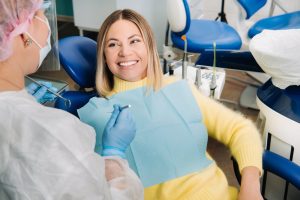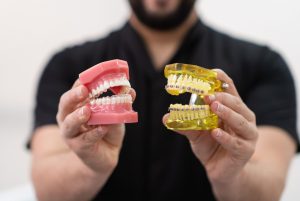Dental emergencies can be a real pain—literally! They can strike when you least expect them. Whether it’s a persistent toothache, a broken tooth, or a knocked-out crown, knowing how to prepare for dental emergencies is essential. In this comprehensive guide, we’ll dive straight into how you can prepare for dental emergencies in Bayswater or Boronia.
Build your emergency dental kit
Dental emergencies can happen at any time. But having a well-equipped dental emergency kit can be a lifesaver. This kit should contain essential items to help you manage dental issues until you can seek professional help. Here’s a checklist of items to include in your dental emergency kit:
- Sterile Gauze Pads or Rolls: These are crucial for controlling bleeding from oral injuries, extractions, or other emergencies.
- Disposable Gloves: Prioritise hygiene and safety by including a pair of disposable gloves to protect yourself and others during dental emergencies.
- Over-the-Counter Pain Relievers: Stock up on pain relievers like ibuprofen to temporarily relieve toothaches or oral pain. Always follow recommended dosage instructions.
- Cotton Balls or Dental Cotton Rolls: Versatile and useful, these can serve various purposes, such as applying antiseptic solutions, stopping bleeding, or stabilising a loose tooth.
- Temporary Dental Filling: A small tube of temporary dental filling is available at most pharmacies. It allows you to temporarily fill a broken tooth to alleviate cold sensitivity and or sharpness which can be very annoying for the tongue. However, an appointment is required immediately.
- Dental Floss: Dental floss can be used to dislodge food particles stuck between teeth, providing relief in case of discomfort.
- Small Mirror with a Handle: A compact dental mirror helps you examine your mouth and identify issues with ease.
- Emergency Dental Contact Information: Keep a list of emergency dental contacts, including your regular dentist’s number and nearby emergency dental clinics.
Remember to regularly check and replenish your emergency dental kit to ensure it’s always ready when you need it.
Know your local emergency dentist
Having access to a reliable emergency dentist is crucial. You don’t want to waste precious time searching for one when an emergency strikes. Familiarise yourself with an emergency dentist in your area. Research local emergency dental services and take note of their office hours, location, and contact details.
Steps to take during a dental emergency
During a dental emergency, it’s natural to feel panicked and stressed. And these feelings can often leave you uncertain about what to do next. But you can prevent that from happening if you know what you can and should do during these stressful moments. Here are a few important steps:
- Stay Calm and Assess the Situation: It’s natural to feel anxious, but try to stay calm. Take a deep breath and check how serious the problem is.
- Contact a Dentist Quickly: After assessing the situation, call a dentist right away. Find an emergency dentist nearby or ask your regular dentist if they can help. Be clear about what’s wrong so they can assist you faster.
Pro Tip: Save your local dentist’s number in your phone for emergencies. - Manage Pain and Discomfort: While waiting for dental care, you can ease the pain with over-the-counter pain relievers like ibuprofen or paracetamol. Follow the instructions on the label, and if you have concerns, consult a healthcare professional. Using a cold pack on the sore area can also help reduce swelling.
First aid for common dental emergencies
Toothaches, knocked-out teeth, broken or chipped teeth, and abscessed teeth are common dental issues that require immediate attention. When these happen, it’s important to know how to administer first aid. Take the following first aid measures so you can receive much-needed relief until you can see a dentist:
- Toothaches: Start by gently flossing around the sore tooth to remove anything stuck. Rinse your mouth with warm saltwater to soothe it. Avoid putting aspirin on your gums; it can hurt.
- Knocked-Out Tooth: If a tooth gets knocked out, hold it by the top part (crown), not the root. Rinse it with milk or saline (not water), and if possible, reinsert it into the socket. Bite down on a clean cloth to hold it in position. If that’s not possible, keep it in milk and see a dentist right away.
- Broken or Chipped Tooth: Rinse your mouth with warm water. If it’s bleeding, use a clean cloth or gauze to apply gentle pressure. If it hurts, follow the pain medicine instructions.
- Abscessed Tooth: This is a severe infection. Rinse your mouth with warm, salty water to ease discomfort. Don’t use heat or aspirin on it. If possible, get to the dentist as soon as you can. At Dainty Dental Care, we leave numerous appointments available for “On day emergencies only” and you can usually be seen on the day if you are in pain. However, if your dentist is unavailable, you can try elsewhere for a temporary fix until you see your regular dentist. Otherwise, a medical GP can prescribe antibiotics or pain relief as a last resort.

Helpful tips for preventing dental emergencies
While knowing how to respond to dental emergencies is crucial, the best approach is to avoid them altogether. Preventive measures can go a long way in safeguarding your oral health and saving you from the discomfort of unexpected dental issues. Here are more detailed preventive measures to consider:
- Regular Dental Check-Ups: Consistent dental visits, typically every six months, are your first line of defence against dental emergencies. These visits allow your dentist to identify potential issues before they worsen.
- Maintaining Excellent Oral Hygiene: A consistent oral hygiene routine, including brushing, flossing, and sometimes using a mouthwash, is vital for preventing dental problems.
- Use Protective Gear: If you’re involved in contact sports or activities with a risk of facial injury, investing in proper protective gear, such as custom-fitted mouthguards or helmets, is a wise choice. We do not recommend “boil-and-bite” mouthguards from the pharmacy or supermarket, however, it is better than nothing.
- Mindful Dietary Choices: Be mindful of your dietary habits, especially regarding sugary and acidic foods and beverages, which can contribute to tooth decay. Opt for a balanced diet that supports overall oral (and body!) health.
- Avoiding Harmful Habits: Refrain from habits that can lead to dental damage, such as nail biting, chewing ice, or using your teeth as tools.
Overall, preparation is key when it comes to dental emergencies. Building a comprehensive emergency dental kit, knowing what you can do before getting professional help, and following preventive measures are all critical steps to ensure you’re ready for the unexpected. Remember, quick action can help until you see an emergency dentist.
If you’re facing a dental emergency in Bayswater or Boronia, call us on 1800 180 581 immediately. Our compassionate dental team is available to assist you promptly. We also strive to accommodate emergency cases on the same day.



